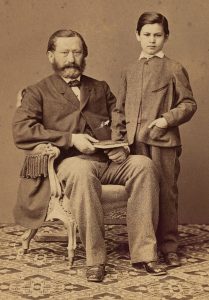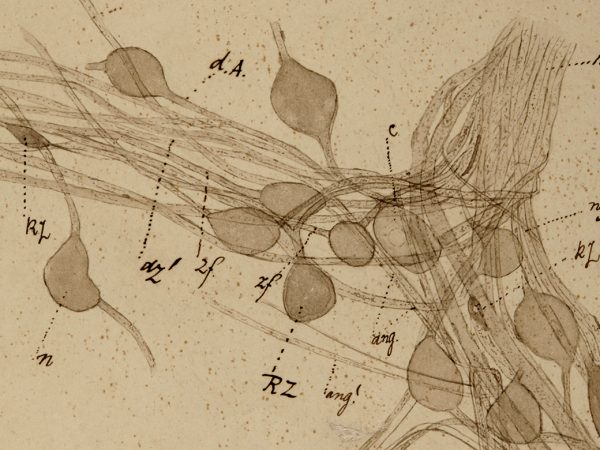
Sigmund Freud and his father Jacob, 1864
Sigmund Freud enrolled at the University of Vienna in 1873.
The son of a struggling Jewish wool merchant, he was the first member of his family to attend university.
He wanted to be a natural scientist. He took classes in anatomy, physiology, botany, zoology and physics.
It was an exciting time for science.
During the 19th century, science and medicine became increasingly separated from religious and spiritual influences.
Freud was a great admirer of Charles Darwin, whose discovery of evolutionary processes had challenged long-cherished beliefs about the origins of humankind, and revolutionised all branches of science.
“The theories of Darwin, which were then of topical interest, strongly attracted me, for they held out great hopes in our understanding of the world.”Sigmund Freud
Scientific progress was fuelling a climate of great hope and optimism. For an ambitious young student like Freud, the prospect of scientific achievement, perhaps even fame, was an alluring possibility.
The Mecca of medicine
In the late 19th century, the University of Vienna was at the cutting edge of research in science and medicine.
Its medical school boasted a team of world-class researchers, and physicians came from all over the world to complete their studies.
Rudolf Virchow, a German scientist and physician, referred to it as the “Mecca of medicine”.
Vienna’s physicians were pioneering many new developments in the university’s hospitals and clinics, from the discovery of antiseptics to the invention of new surgical equipment.
Vitalism vs positivism
“Nature! We are surrounded by her and locked in her clasp: powerless to leave her, and powerless to come closer to her.”Aphorisms on Nature
Freud had been inspired to study the natural sciences by the essay ‘Aphorisms on Nature’, attributed to the romantic writer Johann Wolfgang von Goethe. The essay portrays nature as a loving but mysterious mother – imagery that hints at even deeper motives for his interest in the sciences.
‘Aphorisms on Nature’ is typical of the romantic approach to the natural world called vitalism, which saw living things as animated by a mysterious vital force.
But there was no room for vitalism in the laboratories of the University of Vienna: Freud’s scientific training was stamped with the materialist spirit of the late nineteenth century, sometimes known as positivism, which rejected the vitalist approach as cheap mysticism.
“Life itself could be explained by chemical and physical processes alone, they believed.”George Makari
Freud’s scientific mentors belonged to a generation of researchers who had a strictly biological notion of the human being. They claimed that human beings could be understood entirely in terms of physical and chemical processes: even the notion of free will was often regarded as an illusion.
Although Freud loved literature and was fond of the romantic writers, he absorbed much of the positivism of late 19th century scientific thinking, and this propelled him in his burgeoning research career.
Discover more:

Previous chapter
Freud the Physician
Long before he developed psychoanalysis, Sigmund Freud had already distinguished himself as a scientific researcher and physician.

Next chapter
The Young Anatomist
Freud first trained as scientific researcher, studying tissue samples under the microscope.